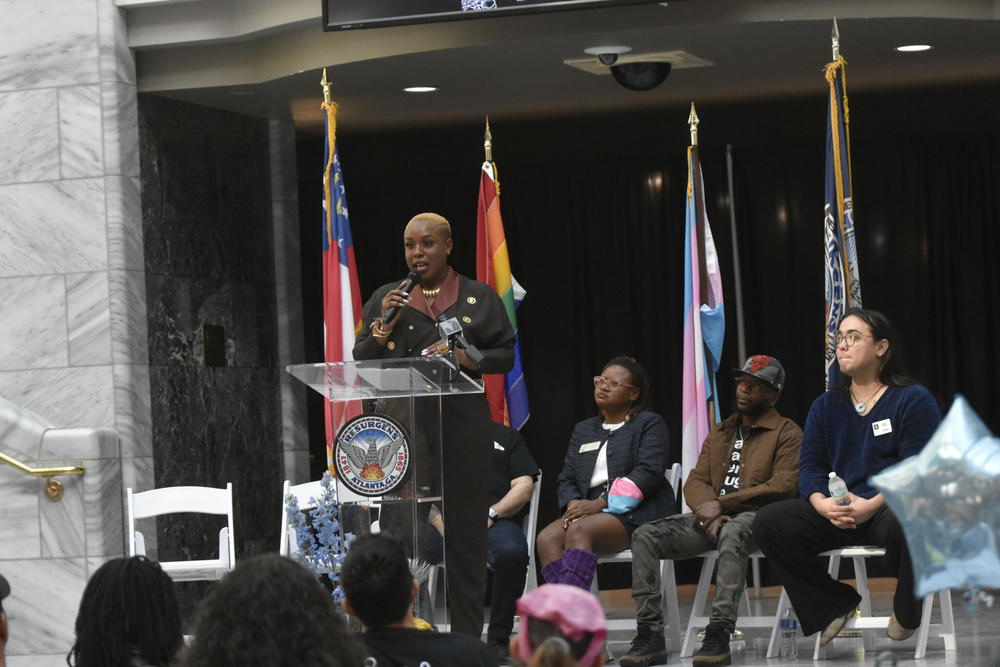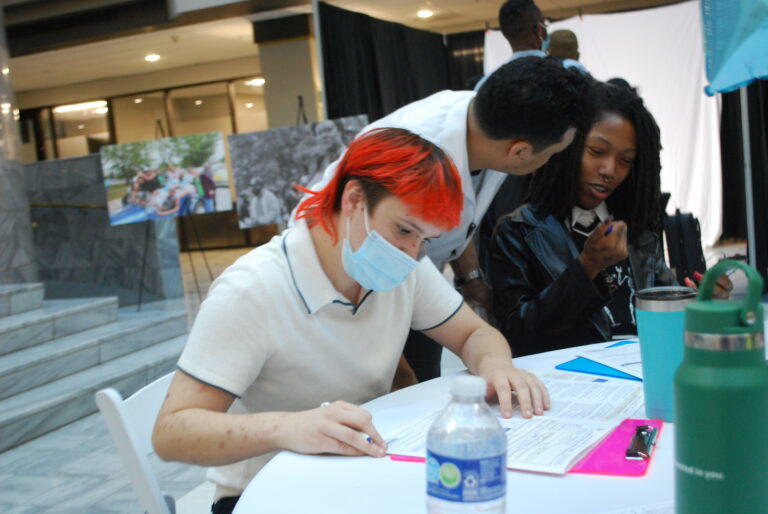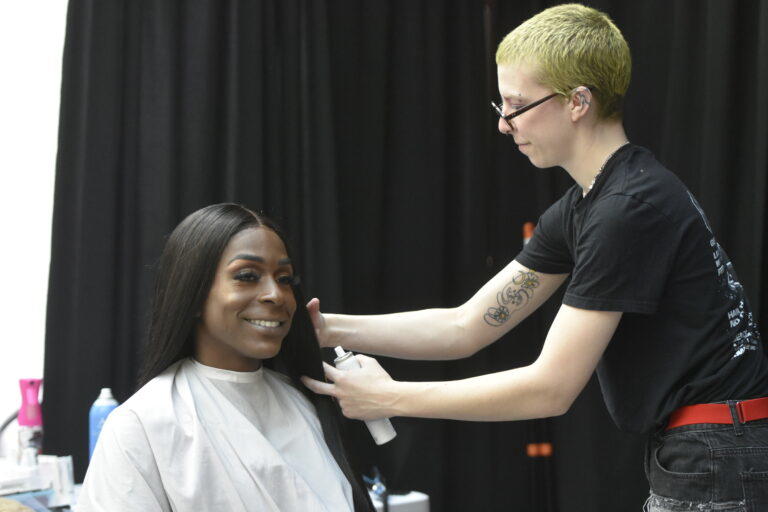
Caption
Toni-Michelle Williams speaks at a transgender passport event in Atlanta Nov. 20, 2024.
Credit: Ross Williams / Georgia Recorder

Toni-Michelle Williams speaks at a transgender passport event in Atlanta Nov. 20, 2024.
A passport can be the key to the world, but to some transgender and nonbinary Georgians it can also mean much more.

Harvey Yeager fills out a passport application form.
About 200 people registered Thursday for a free passport program at Atlanta City Hall organized by two pro-transgender rights organizations, Solutions Not Punishment Collaborative, or SNAPCO, and TransSocial.
Participants gathered around tables in the City Hall lobby and filled out forms with the help of volunteers like Bruno Clesca.
“One thing that can happen is when you’re abroad and you’re misgendered on your passport, that can arise with complications when you’re entering and leaving countries,” said Clesca, a disabled military vet who identifies as nonbinary and has lived abroad extensively. “But also, it’s a federal document that has (your identity) on it, so it is your representation. It’s going to help you personally with how you feel about yourself, and also it’s the federal government recognizing your actual gender.”
Some of the attendees said federal recognition could be a big deal with President-elect Donald Trump set to return to the White House in January.
Trump made rolling back transgender rights a key issue in his campaign, promising at rallies to put a stop to “transgender insanity” in schools and forbid transgender women from competing in women’s sports. Some Georgia trans people aren’t thrilled with all the attention.
“I think there’s a lot of trepidation with conservative control of the executive, legislative and judicial branches that we won’t be able to self-certify anymore,” said Harvey Yeager, a 22-year-old working in transgender health research. “And the kind of loopholes that we’re used to going through will no longer be available to us, so we’re trying to get that stuff done as quick as possible. I know a lot of people are really rushing through like coming out to family, they’re rushing through coming out and getting the gender affirming care they need because they’re worried that it won’t be available to them if they don’t do it.”
In spite of some heavy themes, Wednesday’s event had a festive atmosphere with plenty of laughter as people filled out their paperwork.
“This is like a really easy and chill way to be with people who know your gender identity and understand it and understand the kind of bureaucratic loopholes and like hoops you have to jump through and kind of get the documentation you need without all of that extra stress,” said Yeager, who said he’s looking forward to planning a trip to Venice once he gets his hands on his new passport.
After the participants filled out their forms, volunteer hair and makeup specialists were on hand to help anyone who wanted to get dolled up for their passport photo. Shuttles outside city hall were on hand to drive the participants to the passport office nearby, and the organizers took care of the passport fees.

Jada Brooks gets her hair styled before posing for a new passport photo. Brooks said her top choice travel destination is Egypt.
January will bring more than the new Trump administration. Georgia’s Legislature is set to convene Jan. 13 for its annual session, and legislation targeting transgender Georgians could be on the agenda.
A special Senate committee on women’s sports is set to meet Thursday morning at the Capitol for the third time between sessions. Speaking to a conservative crowd at the state GOP’s election night party, Senate President Pro Tem John Kennedy predicted that a Trump win might mean the end of transgender issues in Georgia.
“We have dealt with issues in Georgia and elsewhere unlike what was in my little hometown,” he said. “We didn’t have issues of transgender. We didn’t have issues of boys in girls’ sports. We didn’t have those problems. And I want to tell you that I think if the election is going the right way as I think it will go tonight, we hope that we won’t have those issues again.”
Frontline Policy Action, an influential conservative lobbying group, has posted a 2025 agenda that includes several proposed bills that could impact LGBTQ people, including a religious freedom bill, codification of the definition of sex, further restricting transgender women from participating in women’s sports, further restricting gender-affirming medical treatments and a ban on drag performances for minors.
Some Democrats, gobsmacked by Vice President Kamala Harris’ convincing loss in the presidential election, have suggested that the party would fare better if it were perceived as less “woke,” putting blame on terms like “Latinx” and an emphasis on transgender issues.
State Rep. Park Cannon, an Atlanta Democrat and member of the LGBTQ community, said she’s confident the state party will unify against anti-transgender legislation if it pops up.
“Sometimes those erasure tactics come from the inside and sometimes they come from the outside, but what we do know is we’re focused on the specific facts that come before us,” she said. “Right now, we’re making sure that transgender folks know that they can get identification before the new administration comes in, that’s why we’re in this passport clinic today, so they have affirming IDs to even get into the state Capitol and to come to these hearings, and then once those bills actually start moving, we will have to have probably some, you know, family conversations within our party to make sure that folks understand.”
“We have strong leadership coming in on the House Democratic side. We have a panel of attorneys who will be leading us, and so I’m excited that we will continue to follow these communities, like SNAPCO, and if there are lawsuits that need to come out after these bills, we know that we have the wherewithal within our leadership team to mount those lawsuits,” she added.
Human Rights Campaign Georgia director Bentley Hudgins said both parties might win more voters by campaigning on issues that affect society at large rather than focusing on small segments of the population.
“I think that Republicans won in spite of the cultural issues,” Hudgins said.
“People are trying to focus on real issues,” they added. “People are dealing with stagnant wages, communities are frustrated with crumbling infrastructure, and people are worried about their kids’ education, people worried about safety, and so these wild culture war issues that extremists keep throwing into the legislature that are distracting the legislators from doing the real work of the people are hopefully going to fall on deaf ears, but we are ready to bring people to the Capitol like we do every year.”
The collaborative’s executive director Toni-Michelle Williams said she’s hoping to bring people to the Capitol to speak with lawmakers next year too, starting with Thursday’s Senate hearing.
“What I recommend to trans and nonbinary folks is to join an organization,” she said. “It is important that we build political power at this time, so join organizations that are dedicated to policy change, join organizations that are dedicated to building a base of folks who have the skills to fight back.”
“We just know that we’re getting ready for the fight of our lives.”
This story comes to GPB through a reporting partnership with Georgia Recorder.